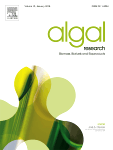Researchers at the National Renewable Energy Laboratory (NREL) have developed a new biorefinery process that more efficiently converts algae to ethanol. The process, Combined Algal Processing (CAP), was featured in the journal Algal Research.
 The research builds on a project previously completed by NREL In that work, the research looked at two promising algal strains Chlorella and Scenedesmus, to determine their applicability as biofuel and bioproduct producers. They concluded Scenedesmus performed better in this process with impressive demonstrated total fuel yields of 97 gallons gasoline equivalents (GGE) per ton of biomass.
The research builds on a project previously completed by NREL In that work, the research looked at two promising algal strains Chlorella and Scenedesmus, to determine their applicability as biofuel and bioproduct producers. They concluded Scenedesmus performed better in this process with impressive demonstrated total fuel yields of 97 gallons gasoline equivalents (GGE) per ton of biomass.
The next step is to reduce the costs of conversion. The research team has looked at increasing the amount of lipids in algae but found the it won’t significantly reduce the costs. However, the NREL team has determined further progress could be made by more completely using all algal cellular components instead of just relying on the lipids. By applying certain processing techniques, microalgal biomass can produce carbohydrates and proteins in addition to lipids, and all of these can be converted into co-products.
According to NREL, the team has determined that through the use of a solid-liquid separation process, the carbohydrates can be converted to fermentable sugars, which can then be used to produce ethanol. However, as much as 37 percent of the sugars were lost during that process. Those trapped sugars “cannot be used for fermentation without a costly washing step, resulting in a loss of overall fuel yield,” according to the Algal Research report.Read More







 Pacific Ethanol
Pacific Ethanol


